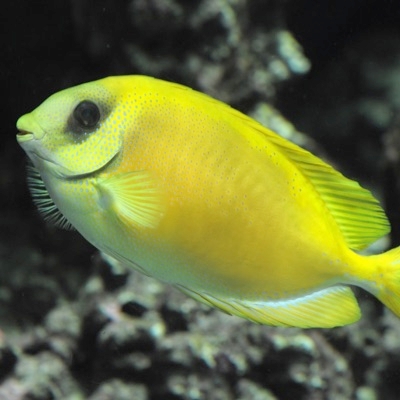Are You Considering A Fish?
Summary:
Fish are often ideal pets for people with space limitations or allergies to other common pets. Fish come in all shapes, sizes and colors. Learn how to prepare, care for, and safely interact with your new aquarium pet fish.


Before choosing a fish
-
Find out what types of fish and aquariums are suitable for your family. Certain types of fish require more extensive care and supplies than others.
-
Learn about the different types of aquariums and their maintenance needs. Work with pet store staff to decide if a fresh or salt water tank is right for you.
-
Match the size of the tank to the space available in your home and to the amount of time you have to maintain it. Consider purchasing a second aquarium to be used when you're cleaning your first tank, or to house new fish before you place them in your established tank. Having a second tank to temporarily house fish may help reduce their stress and disease.
-
Once you have decided what type of aquarium you want, learn how to set it up properly. Consider the following:
- tank size
- gravel type
- plants
- water temperature
- lighting (UV, etc.)
- aquarium filters and pumps
- methods to treat the water (chemically, etc.)
- frequency of tank cleaning and maintenance
- equipment and accessories
-
Ask your veterinarian about the proper set-up of your aquarium, the types of fish you should keep, as well as food, care, and environmental requirements of your fish.
-
Before you bring your fish home, make sure your aquarium is ready. Ask your veterinarian about "cycling a tank" to get the bacteria and nitrogen levels balanced.
Choosing aquarium fish
-
Learn which fish can go in the aquarium you have. Most fish live exclusively in either saltwater or freshwater, not both. Consider the number of fish to keep in your tank; a good standard is 1 inch of fish per gallon of water. Also, evaluate which species of fish can be in the same tank together and what types of food they will need.
- Some types of fish, like male betta fish, can't be in the same aquarium together because they will fight. However, having multiple female betta fish in the same aquarium is not a problem.
-
Pick fish that are active in their tanks in the pet store. Compare the fish to those of the same type around it. Is it acting like the others or is it off by itself? Is it able to swim normally?
-
Do not select fish from a tank that has a high number of dead fish.
-
Healthy fish should have smooth, sleek, shiny scales that are free from discoloration. Their bodies should not have any bumps, and their fins should be intact.
-
When bringing a new fish home, it is very important to acclimate it to your aquarium water. Purchased fish will often be given to you in a clear bag with water from their tank at the store. This water will be a different temperature than your aquarium water at home. To acclimate your fish:
-
Place the entire bag, still intact, in your aquarium to float at the surface for about 30 minutes to an hour to acclimate the fish to the temperature of the tank.
-
Then, carefully open and gradually pour the bag to release the fish into your tank.
- Do not remove the fish from the bag with a small net as this may injure the fish.
- Try not to pour too much water from the bag into your aquarium at home because of the possible germs it may contain.
-
The American Veterinary Medical Association provides additional information about selecting fish.
-
Cleaning and maintaining your aquarium
-
Be aware that fish and their aquariums may carry germs.
- Wash your hands before and after cleaning or maintaining the aquarium or aquarium water. Plan to wear gloves when working with rough rocks or spiny fish to avoid injury.
-
If you have any cuts or wounds on your hands, wear gloves or wait until your wounds are fully healed before working with your fish or aquarium water to avoid possible infection.
-
Avoid cleaning fish aquariums in areas where people with weak immune systems may be affected.
-
Don't allow children younger than 5 years of age or people with weak immune systems to clean aquariums.
-
Don't use kitchen sinks to dump aquarium water into or to wash aquariums. If you use a bathtub to dump aquarium water into or to wash aquariums, clean the tub thoroughly afterwards, and use a commercial disinfectant like bleach according to the manufacturer's instructions. Do not mix bleach with other cleaners, especially ammonia.
Monitor your pet's health
- Monitor your fish daily for signs of illness. Symptoms may include abnormal swimming; appearance of red, brown, or white splotches; lack of appetite; or swelling.
- If a fish in your tank ever looks sick, it is best to remove it and place it in a tank by itself. This will help prevent other fish in your main aquarium from getting sick.
- Getting a diagnosis from a veterinarian experienced in fish medicine.
- Promptly remove any dead fish from your aquarium to decrease the risk of spreading disease to your other fish.
- Even though fish appear healthy, they may still spread germs to humans. If you become sick shortly after purchasing new fish or cleaning your aquarium, make sure to tell your healthcare provider that you have a pet fish.
What to do if you no longer want your pet fish
-
Do not release your pet outdoors. Most fish released into ponds or rivers will die, and some grow to become a threat to natural wildlife populations.
-
Find a new home for your pet:
- Contact a nearby pet store for advice or for possible returns.
- Consider giving your pet to another fish hobbyist.
- Contact a local aquarium, school, or zoo to see if they would accept your pet.
- Talk to your veterinarian. He/she may be able to help you find a new home for your pet.
Fish fin scratches
Some larger fish have sharp points in their fins that could scratch or damage your skin when you are cleaning or working in the tank. This is an unusual occurrence, but germs can spread from fin scratches or scrapes from the gravel or rocks in the tank, even when the wound does not seem deep or serious.
Some fish are dangerous and even venomous and may not be safe to keep. Just because you can buy a fish doesn't mean that it's safe or legal to own. Some fish have venoms they can release to protect themselves, like lionfish and some types of catfish. Most fish do not have teeth that can cause damage to skin, but some, like piranhas, have very sharp teeth that can cause serious harm.
-
If you are scratched or bitten by a fish, you should:
-
Wash your wounds with soap and water immediately.
-
Seek medical attention:
- If the wound becomes red, painful, warm, or swollen, or
- If the wound is serious (uncontrolled bleeding, loss of function, extreme pain, or there is muscle or bone exposure).
-
-
If you seek medical attention, make sure to tell your healthcare provider you have had contact with fish and aquariums.


